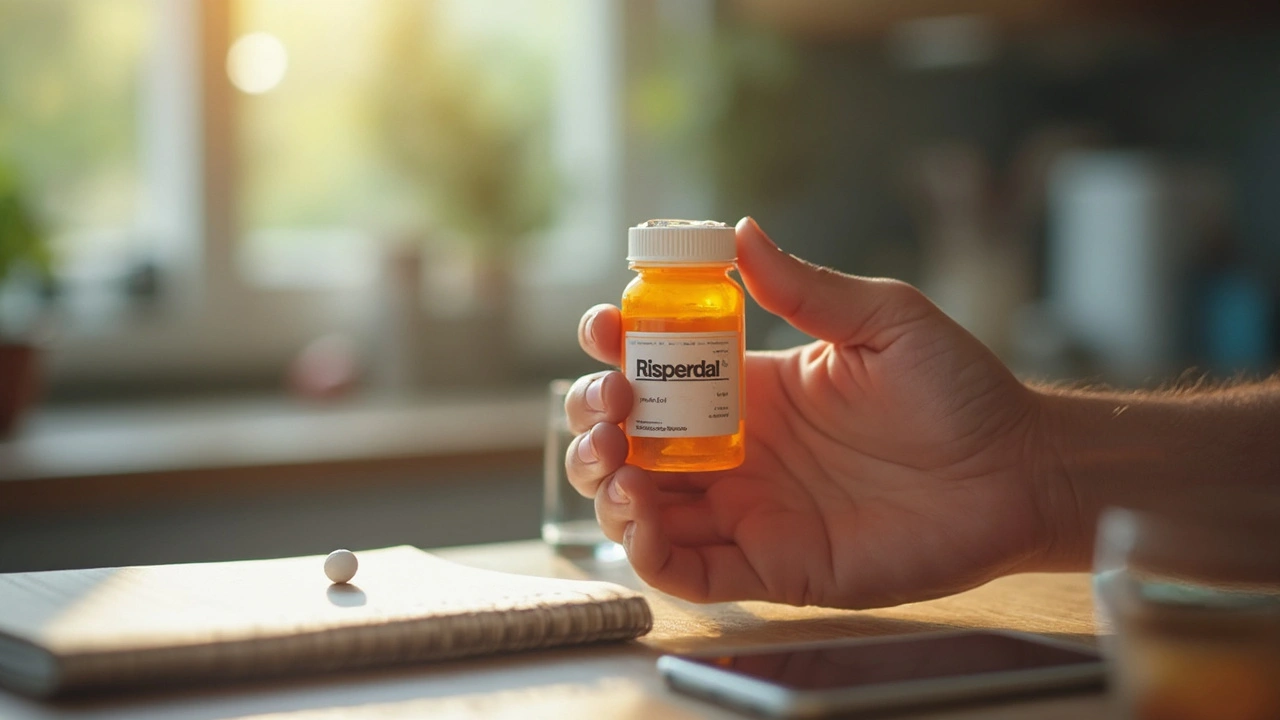Schizophrenia. Bipolar disorder. Irritability tied to autism. These are the heavyweight fights Risperdal steps into every single day. But if you've ever read the warnings or scanned a pharmacy insert, you know Risperdal’s story isn’t a simple fairy tale about people feeling better. Behind that small white pill, there’s a complex web of pros, cons, and very real human experiences. Here’s what you need to know in 2025—even if you’ve never set foot in a psychiatrist’s office.
What Is Risperdal, And Who Takes It?
First off, Risperdal is the brand name for risperidone. It’s an atypical antipsychotic, which basically means it acts differently from older meds like haloperidol. The FDA gave it the green light for treating schizophrenia in adults back in 1993, and since then, its approved uses have grown to include bipolar mania, autism-related irritability in kids aged 5-16, and even off-label conditions (think Tourette’s or severe OCD, though doctors have to use their own judgment there). In the United States, Risperdal sits on the World Health Organization’s List of Essential Medicines. So yes, it’s a big player globally, found in clinics, mental health wards, and—maybe—your kitchen cupboard right now.
Risperdal works by changing how key neurotransmitters fire in your brain. It mainly blocks dopamine and serotonin receptors, which helps dial-down the excess dopamine linked to delusions, aggression, or wild mood swings. That’s why psychiatrists often choose it over older drugs that only focused on dopamine: the aim is to get results with fewer unwanted side effects, like those notorious involuntary muscle twitches (tardive dyskinesia). Still, Risperdal isn’t a ‘set it and forget it’ treatment. Everyone’s brain is different—so the way it works can be unpredictable, especially at first.
How do folks actually use it? Most start on a low dose, maybe 1-2mg a day, with the option to move up slowly. Some take it just before bed to sleep through early side effects—others need it in the morning for daytime symptoms. Risperdal comes in tablets, liquid, and even long-acting injections (Risperdal Consta), usually lasting two weeks between shots. Doctors tailor the dose to your age, the severity of symptoms, and how you respond. For younger patients, dosing is extra cautious; pediatric use remains a hot debate because growing bodies are far more sensitive.
Why so many people turn to Risperdal is no mystery. Schizophrenia, when left unchecked, can upend lives. Outbursts from bipolar mania burn relationships, jobs, and self-esteem. Aggression or severe mood swings in autism can make simple routines feel impossible. For many, Risperdal offers a shot at stability, fewer hospital visits, and a little more control over daily life—and that’s huge when you think about just trying to get from breakfast to bedtime without the world flying apart.

Risperdal Side Effects: The Real Story
Every medication has a dark side, and Risperdal is no exception. Users swap stories about weight gain, fatigue, weird changes in appetite, even sexual side effects. One thing almost every patient and doctor agrees on: side effects can sneak up or hit like a hammer—sometimes both. Weight gain stands out because it’s so common and, frankly, hard to ignore. People can add 10, 20, even 30 pounds in a matter of months. Appetite revs up, cravings for carbs skyrocket, and suddenly nothing in your closet fits.
That’s not the only thing. Risperdal can raise levels of a hormone called prolactin. Too much prolactin can cause breast enlargement (gynecomastia) and milk production in men and women—something nobody expects and few want to talk about. This can startle people enough to quit the drug without medical advice, creating a new set of problems as symptoms race back. There’s also the risk of metabolic syndrome, where high blood sugar, unhealthy cholesterol, and extra weight increase chances of heart disease and diabetes. Yearly bloodwork isn’t such a bad idea if you’re on a long-term prescription.
The list goes on: sedation, muscle stiffness, tremors, restlessness, and sometimes confusion or low mood. Elderly people—especially those with dementia—face a higher chance of stroke or death if given *Risperdal.* That fact alone has changed the way nursing homes and hospitals look at this drug in recent years. In teenagers and young adults, there's a slight but real risk of movement disorders, including the much-feared tardive dyskinesia. It may show up as strange facial movements, tongue rolling, or twitchy limbs—even months after the drug's stopped. That’s why most psychiatrists keep a close watch, especially in people under 25.
Drug interactions matter, too. Mixing Risperdal with antidepressants, blood pressure meds, or other antipsychotics could make side effects worse or even dangerous. Alcohol and cannabis can increase sedation dramatically. Grapefruit juice may raise Risperdal levels by affecting liver enzymes—a surprising fact that seems random, but it’s the real deal. A lot of everyday things could mess with how Risperdal works, so honesty between you and your doctor is priceless here.
There’s debate over whether side effects fade away or just become part of life. For many, the first few weeks are the roughest. Symptoms like fatigue, dizziness, and brain fog often improve as your body adjusts to the med. Sticking with a healthy diet, getting enough exercise, and checking in with your doctor regularly helps a lot. Don’t ignore things, hoping they’ll vanish—report side effects, ask questions, keep a journal if you want. Self-advocacy matters more than ever with a medication like this.

Living With Risperdal: What Works, What Doesn’t, and Key Tips
No one takes a leap into a medication like Risperdal lightly. Users and families spend a lot of time weighing the risks against the benefits, wondering: Is there a way to make this easier? There’s no perfect formula, but lessons from real patients and clinicians can make the path smoother.
The best outcomes come with routine. Take risperdal at the same time each day. Consistency matters, especially since missing doses can mean a quick return of symptoms. Set an alarm on your phone or use a pill organizer—old-school, but it works. And don’t switch pills, skip days, or double up without checking in with your doctor first.
Bloodwork and health checks aren’t just bureaucratic boxes to tick. Monitoring things like blood sugar, cholesterol, and prolactin actually helps your doc spot trouble early, sometimes before you even notice anything’s off. If weight gain is starting to creep up, little tweaks in your habits can make a difference. Swap late-night high-carb snacks for nuts or fruit. Try a short walk every day after dinner. Yeah, easier said than done when you feel wiped out all the time, but building small habits beats trying to overhaul your life all at once.
Even if Risperdal dials down your symptoms, don’t ditch therapy or counseling. Meds plus talk therapy pack a bigger punch than medication alone, especially for conditions like schizophrenia or bipolar disorder. Get family or friends on board if possible. Sometimes, others notice side effects before you do, so listen when someone points out changes in your mood, movement, or sleep.
If you’re parenting a kid on Risperdal, the game plan changes a bit. Growth and puberty make everything trickier. Stay on top of regular check-ins, school reports, and mood changes at home. Watch for sudden weight gain or unexpected behaviors. Make sure teachers and caregivers know about the meds—confidentially, of course—so they can flag any odd symptoms. Teens are more at risk for things like tardive dyskinesia or hormone changes, so it’s better to catch side effects early.
Don’t fall into the trap of thinking you’ll just ‘power through’ the rough patches. If you feel awful, let your prescriber know. Dose adjustments, switching to another antipsychotic, or adding a new med for side effect relief are all on the table—if you speak up. Doctors aren’t mind-readers, so you have to tell them what’s really happening.
Curious about alternatives? There are plenty: aripiprazole, quetiapine, olanzapine, and more. Each one comes with its own benefits and baggage. You might hear friends rave about one and curse another, but the only way to know what works is trial and error, guided by a psychiatrist who actually listens. Don’t be afraid to ask tough questions—about how long you’ll need the med, how to spot dangerous side effects, or what to do if insurance stops covering it.
What’s different about 2025? There’s more info now than ever before, and online support groups are everywhere. Sites like Drugs.com or honest threads on Reddit give you the real scoop—straight from people who know the struggle. Just keep in mind that everyone’s journey is different. Meds for the mind aren’t a ‘one size fits all’ deal. Trust your gut, find a care team you relate to, and be ready to speak up for your own health—because with Risperdal, you’re in the driver’s seat. Side effects are real, but for a lot of people, so is relief.


Ellie Haynal
July 18, 2025 AT 15:59Honestly, I find the discourse around Risperdal pretty tricky. Like, yes, it's helpful for a bunch of people, but let's not kid ourselves about the side effects—it can be a nightmare for some.
I've seen way too many folks get stuck dealing with weight gain, fatigue, and mood swings, which can sometimes feel worse than what they're trying to treat! It's such a delicate balance. I mean, are we really being truthful when doctors just hand this out like candy? Where’s the accountability?
Also, I think patients are often left in the dark about how their daily lives will change. It’s not just about the medical stats—it’s about how it feels on a human level. Does anyone else feel this is an overlooked part? It’s never just black and white with these meds.
Jimmy Gammell
July 23, 2025 AT 01:06Hey there! I get where you're coming from, Ellie. :) Risperdal really does have a mixed bag of effects. I’ve seen my family member start this medicine and while some side effects kicked in, the improvements were noticeable over time. It’s all about managing expectations and working closely with healthcare providers.
My advice for anyone starting Risperdal: keep a journal of how you feel day-to-day. It helps a lot during consultations to pinpoint what’s helping and what’s troubling you.
Also, community support plays a big role, you know? No need to face these challenges alone. <3 Anyone else got tips for coping on this med?
fred warner
July 27, 2025 AT 09:06I appreciate this post. It strikes me that education about Risperdal is absolutely crucial, especially with all the misconceptions floating around.
It’s a powerful antipsychotic that's been around for a while, and like many psychiatric medications, it takes time to find the right dose and regimen. The side effects vary a lot from person to person, so clinicians have to tailor treatment carefully.
For anyone on Risperdal, staying in touch with your doctor and reporting even minor side effects can make a difference. And, to those skeptical about antipsychotics in general, remember that untreated symptoms can severely impact quality of life. It’s a matter of weighing risks and benefits thoughtfully.
Veronica Mayfair
July 30, 2025 AT 06:33😊 Hey y’all! Just jumping in to say that this article really helped demystify Risperdal for me. Before reading, I was scared about the side effects but it’s comforting to know what to expect and how people manage them.
Also, the practical tips were spot on! Like, staying hydrated and eating well can make a big difference in how you feel.
Has anyone found creative ways to cope with the drowsiness? I sometimes find it hard to stay active but want to keep up with my daily workouts. 🏃♀️✨
Rahul Kr
August 2, 2025 AT 04:00Nice one for bringing this info out. I have observed a few friends on Risperdal and they vary widely with reactions. Some got no side effects and improved quickly, others struggled a lot.
Important thing is patience and close monitoring. In my experience, understanding your body’s signals is key and reporting back to docs honestly.
Also, finding a good support system whether family or friends reduces stress significantly! What kind of follow-up routines do you all have on this med?
Anthony Coppedge
August 5, 2025 AT 15:20I appreciate the balanced approach here. As someone who values precise info, I think it’s essential that patients are educated not just about the benefits but the full spectrum of possible effects.
The issue with Risperdal, or risperidone, is that while it's beneficial, it can also cause extrapyramidal symptoms, weight gain, metabolic changes, and hormonal issues such as increased prolactin levels. These aren't trivial side effects, yet many prescriptions don’t accompany thorough guidance about them.
Communication between patient and healthcare provider must be proactive. Patients should never hesitate to ask questions or demand thorough explanations. It's their health on the line!
Joshua Logronio
August 9, 2025 AT 02:40Totally suspicious about how pharma pushes these drugs. 🤨 They get approved quickly, then bam! You're on Risperdal. Who knows what else is being swept under the rug? I've read claims about undisclosed side effects that surface only years later...
This article is helpful but I wonder if it tells the whole story? Some say the long-term impact on brain chemistry and the risk of tardive dyskinesia are downplayed.
How do we really trust the system when profits seem to outweigh patient welfare? Always gotta think critically.
Nicholas Blackburn
August 10, 2025 AT 06:26You're seriously overestimating the efficacy and underestimating the harms of Risperdal if you think it’s a miracle drug. It’s a classic case of a pharmaceutical mess that no one talks enough about. Sure, some benefit, but a gargantuan number suffer severe side effects—often worse than the supposed illness.
Wake up and smell the reality. Weight gain, sedation, hormonal chaos—hell, I’ve seen it wreck lives and the docs just act like it’s routine. Honestly, skepticism is warranted. Don’t just swallow the pharma tea.
Dave Barnes
August 12, 2025 AT 14:00There’s something quite fascinating about the dichotomy in opinions on Risperdal. On the one hand, you have the hopeful, pragmatic approach acknowledging its benefits, and on the other, the vocal skepticism fueling conspiracy theories.
Maybe the truth isn’t absolute but a nuanced understanding: Yes, it can help, but it can also harm if misused or poorly monitored. This mirrors much of our approach to medicine in general.
Philosophically speaking, our quest for mental health solutions should be careful, informed, and compassionate. Discussing meds like Risperdal amid openness reduces stigma and promotes smarter use.
Kai Röder
August 14, 2025 AT 21:33I want to add that while concerns and side effects are valid, we shouldn’t let fear overshadow the importance of psychiatric medications like Risperdal for those who truly need them.
Many patients achieve significant stability and quality of life improvements when properly supervised. It’s about careful prescribing and ongoing evaluation rather than blanket condemnation.
Healthcare systems should focus on comprehensive care, including therapy, social support, and monitoring, not just pharmacology alone. That’s where real patient-centered outcomes lie.
Brandi Thompson
August 17, 2025 AT 05:06This entire situation reeks of poorly managed healthcare expectations and emotional manipulation by both doctors and pharma companies!!!! 💥 I’ve dealt with Risperdal hysteria in my family, and it’s like the constant back and forth between "this is crucial" and "oh god, it’s ruining you" is just toxic nonsense.
We need transparency, accountability, and an open forum where patients can share true stories without fear. And stop sugarcoating - if it’s messing you up, say it! Don’t let anyone silence the reality of side effects which often go unreported because of stigma and shame. The truth should always be loud and clear in medicine!!!